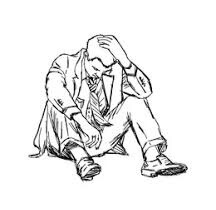How to Recognize and Manage Anxiety in Men
Introduction
Society often expects men to appear calm, composed, and in control, no matter what life throws at them. From being a provider for their family to managing work pressures and personal responsibilities, men carry several invisible burdens. These constant demands can take a serious toll on their mental and emotional well-being — often leading to anxiety that goes unnoticed.
Many men hesitate to acknowledge or discuss their anxiety because of the fear of judgment, shame, or outdated societal beliefs that “real men don’t worry.” But anxiety is not a weakness — it’s a human experience. Recognizing it doesn’t make you less of a man; it’s the first step toward taking back control of your life and emotions.
Understanding Anxiety
Anxiety is a state of persistent worry, fear, or uneasiness that affects your daily life, thoughts, and overall health. It’s much more than occasional stress or nervousness. Sometimes, men mask anxiety under layers of denial or distraction, unaware that what they’re feeling — irritability, restlessness, or constant tension — might actually be anxiety.
How Anxiety Shows Up in Men
1. Emotional Signs
- Constant worry or overthinking
- Feeling stuck in thoughts
- Sudden bursts of anger or frustration
- Difficulty relaxing or switching off
- A constant sense of fear or doom
2. Behavioral Signs
- Withdrawing from family and friends
- Overworking or staying busy to avoid emotions
- Increased use of alcohol, nicotine, or other substances
- Avoiding social situations or responsibilities
- Procrastination or indecisiveness
3. Physical Signs
- Rapid heartbeat or chest tightness
- Sweating or trembling
- Muscle tension or unexplained body pain
- Difficulty sleeping or staying asleep
- Fatigue despite resting
These symptoms are often mistaken for “just stress.” But when ignored, chronic anxiety can lead to burnout, health problems, and relationship struggles.
Why Men Struggle to Acknowledge Anxiety
Upbringing, fear of judgment, ego, and social conditioning play a major role in why men hide their emotional pain. Many are taught that expressing feelings is a sign of weakness. However, true strength lies in acknowledgment and confrontation. Recognizing your anxiety is not a failure — it’s a sign of self-awareness, courage, and self-love.
Common Triggers of Anxiety in Men
- Work pressure or long hours
- Job insecurity
- Financial stress
- Responsibility to provide
- Relationship issues or communication gaps
- Health concerns
- Physical fatigue
- Major life transitions (career changes, fatherhood, loss, etc.)
- Unresolved trauma or emotional suppression
How to Manage Anxiety
The key to managing anxiety starts with understanding your triggers. Once you identify them, you can create a plan to respond mindfully instead of reactively. Managing anxiety isn’t a one-day task — it requires consistency and compassion.
Here are some effective, evidence-based strategies:
1. Acknowledge Your Feelings
It takes courage to admit you’re struggling. Acceptance opens the door to healing and personal growth.
2. Prioritize Physical Health
Your body and mind are connected. Regular exercise, proper sleep, and a balanced diet can significantly lower anxiety levels.
3. Practice Mindfulness and Deep Breathing
Meditation and deep breathing exercises calm your nervous system and help you stay grounded in the present moment.
4. Reframe Negative Thoughts
Write down your worries and challenge them with logic and positivity. Replace “What if I fail?” with “I’ll try my best, and that’s enough.”
5. Set Healthy Boundaries
Learn to say no. Don’t overload yourself with responsibilities. Take time to unplug — your mind needs rest just as much as your body does.
6. Stay Connected
Spend time with people who uplift you. Isolation feeds anxiety, while connection heals it. Talking about what you’re feeling can bring immense relief.
7. Seek Professional Support
There’s no shame in getting help from a therapist or counselor. Professional guidance can help you identify patterns and build coping tools that work for you.
8. Build Emotional Strength Gradually
- Allow yourself to feel — don’t bottle it up.
- Avoid comparing your journey with others.
- Celebrate small wins.
- Focus on progress, not perfection.
Supporting Others Who Struggle
If you notice a loved one showing signs of anxiety, offer your support without judgment. Sometimes, simply being there and listening can make a huge difference.
Conclusion
Recognizing and managing anxiety is not a sign of weakness — it’s a declaration of strength. By acknowledging your emotions, you aren’t losing control; you’re reclaiming it.
So, if you’ve been holding it all in, take this as your reminder: it’s okay to slow down, breathe, and ask for help when you need it. Real strength doesn’t come from pretending to be unshakable — it comes from learning to stay steady, even when life shakes you.
